Louignac / Lonhac
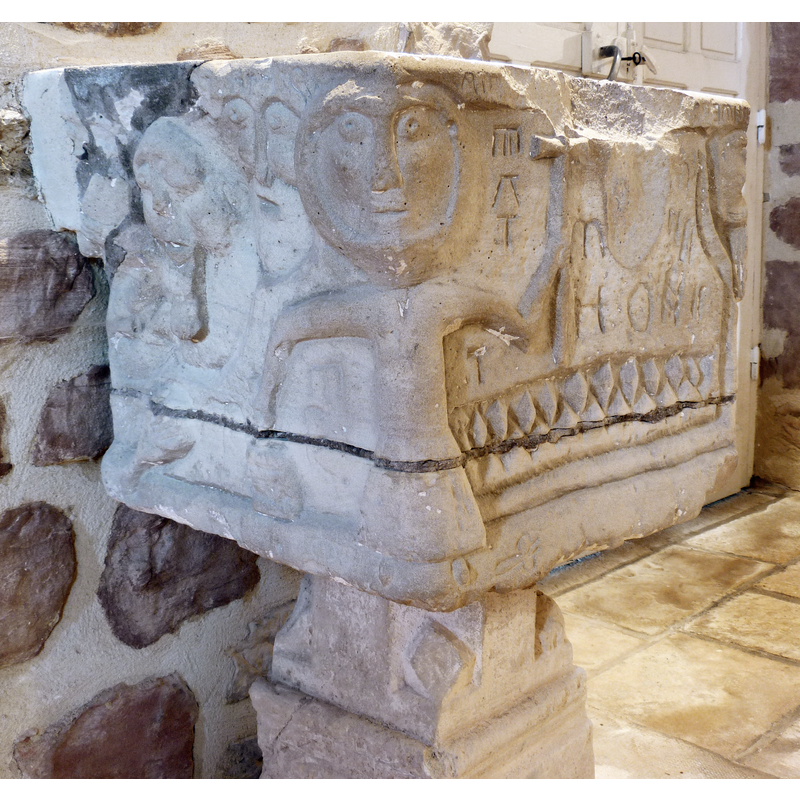
Image copyright © Juan Antonio Olañeta, 2011
Standing permission
Results: 18 records
B01: human figure - with cross in left hand
Copyright Statement: Image copyright © David Marmonier, 2004
Image Source: digital photograph in http://correzeromane.free.fr
Copyright Instructions: Permission received (e-mail of 28 April 2004)
B02: design element - motifs - diamond or lozenge
Scene Description: a band
Copyright Statement: Image copyright © David Marmonier, 2004
Image Source: digital photograph in http://correzeromane.free.fr
Copyright Instructions: Permission received (e-mail of 28 April 2004)
B03: human figure - head - 3
Scene Description: two of them are bearded, although one of them the beard is like an Egyptian pharaoh's; the third head is flat on its ear, in the bottom left corner; almost groqtesque
Copyright Statement: Image copyright © David Marmonier, 2004
Image Source: digital photograph in http://correzeromane.free.fr
Copyright Instructions: Permission received (e-mail of 28 April 2004)
B04: inscription
Scene Description: perhaps Latin and Greek alphabet letters
Copyright Statement: Image copyright © David Marmonier, 2004
Image Source: digital photograph in http://correzeromane.free.fr
Copyright Instructions: Permission received (e-mail of 28 April 2004)
B05: inscription
Copyright Statement: Image copyright © David Marmonier, 2004
Image Source: digital photograph in http://correzeromane.free.fr
Copyright Instructions: Permission received (e-mail of 28 April 2004)
view of font - southwest side
Copyright Statement: Image copyright © Juan Antonio Olañeta, 2011
Image Source: digital photograph taken 12 February 2011 by Juan Antonio Olañeta [www.claustro.com]
Copyright Instructions: Standing permission
view of font - south side
Copyright Statement: Image copyright © Juan Antonio Olañeta, 2011
Image Source: digital photograph taken 12 February 2011 by Juan Antonio Olañeta [www.claustro.com]
Copyright Instructions: Standing permission
view of font - upper view
Copyright Statement: Image copyright © Juan Antonio Olañeta, 2011
Image Source: digital photograph taken 12 February 2011 by Juan Antonio Olañeta [www.claustro.com]
Copyright Instructions: Standing permission
view of font - southwest side
Copyright Statement: Image copyright © Juan Antonio Olañeta, 2011
Image Source: digital photograph taken 12 February 2011 by Juan Antonio Olañeta [www.claustro.com]
Copyright Instructions: Standing permission
view of font - south side
Copyright Statement: Image copyright © Juan Antonio Olañeta, 2011
Image Source: digital photograph taken 12 February 2011 by Juan Antonio Olañeta [www.claustro.com]
Copyright Instructions: Standing permission
view of font - southeast side
Copyright Statement: Image copyright © Juan Antonio Olañeta, 2011
Image Source: digital photograph taken 12 February 2011 by Juan Antonio Olañeta [www.claustro.com]
Copyright Instructions: Standing permission
view of font
Scene Description: the old basin on a modern base
Copyright Statement: Image copyright © David Marmonier, 2004
Image Source: digital photograph in [http://correzeromane.free.fr/louignac.pdf] [accessed 17 September 2010]
Copyright Instructions: Permission received (e-mail of 28 April 2004)
view of basin - west side
Copyright Statement: Image copyright © Juan Antonio Olañeta, 2011
Image Source: digital photograph taken 12 February 2011 by Juan Antonio Olañeta [www.claustro.com]
Copyright Instructions: Standing permission
view of basin
Scene Description: the much damaged side
Copyright Statement: Image copyright © David Marmonier, 2004
Image Source: digital photograph in [http://correzeromane.free.fr/louignac.pdf] [accessed 17 September 2010]
Copyright Instructions: Permission received (e-mail of 28 April 2004)
view of basin
Scene Description: the two decorated sides
Copyright Statement: Image copyright © David Marmonier, 2004
Image Source: digital photograph in [http://correzeromane.free.fr/louignac.pdf] [accessed 17 September 2010]
Copyright Instructions: Permission received (e-mail of 28 April 2004)
view of church interior - capital
Scene Description: Source caption: "Trois chapiteaux sont restés à leur emplacement d’origine. Ils représentent des acrobates, un personnage agenouillé entre des lions, et deux saints dans des mandorle, Pierre et un évêque. Ils sont sculptés dans le calcaire [...] Tous datent du milieu du XIIe siècle."
Copyright Statement: Image copyright © Eglises de Corrèze, 2017
Image Source: digital photograph taken by Jean-François Amelot, in Eglises de Corrèze [http://eglises.de.correze.online.fr/] [accessed 19 February 2017]
Copyright Instructions: No known copyright restriction / Fair Dealing
view of church interior - capital
Scene Description: Source caption: "Trois chapiteaux sont restés à leur emplacement d’origine. Ils représentent des acrobates, un personnage agenouillé entre des lions, et deux saints dans des mandorle, Pierre et un évêque. Ils sont sculptés dans le calcaire [...] Tous datent du milieu du XIIe siècle."
Copyright Statement: Image copyright © Eglises de Corrèze, 2017
Image Source: digital photograph taken by Jean-François Amelot, in Eglises de Corrèze [http://eglises.de.correze.online.fr/] [accessed 19 February 2017]
Copyright Instructions: No known copyright restriction / Fair Dealing
INFORMATION
Font ID: 09461LOU
Object Type: Baptismal Font1, fragment
Font Century and Period/Style: 10th - 12th century, Pre-Romanesque? / Early Romanesque?
Church / Chapel Name: Église paroissiale Saint-Julien de Brioude
Font Location in Church: Inside the church
Church Patron Saint(s): St. Julian of Brioude [3rd cent. martyr] [aka St. Julien d'Auvergne]
Church Address: 19310 Louignac, France
Site Location: Corrèze, Nouvelle-Aquitaine, France, Europe
Directions to Site: Located at the D51-D95 crossroads, 30 km NW of Brive, near the regional border with the Dordogne
Ecclesiastic Region: Diocèse de Tulle [ancien diocèse de Limoges]
Historical Region: Limousin
Additional Comments: damaged font: only a fragment remains -- MUST USE have images & permission to repro
Font Notes:
Click to view
Described and illustrated in Marmonier (2005) as the fragmentary remains of a quadrangular baptismal font in the church of Saint-Julien de Brioude in Louignac, a font that he describes as a good example of a rural art that is uncouth yet a little esoteric. Marmonier (ibid.) informs that an older church existed here since the 6th century and, perhaps, this font decorated with crude figures and enigmatic inscriptions, may refer to an earlier age than the present Romanesque church; only one full panel and one partial panel have survived; the full panel has a large figure at each angle, one of them holding a processional (?) cross in the left hand, the right holding an object, perhaps a sword, of which almost nothing remains; on the right side of this figure, three heads, one of which horizontal are depicted together with two letters (?), perhaps an M and a D (?); to the left of the figure, on the full panel, a band of dogtooth or similar motif above two thin mouldings decorate the bottom part; another figure, only partially visible, appears at the opposite corner; between them, a number of letters [M, H, O, T appear recognisable] but also a few other signs that may or may not be Greek characters. This decoration is not unlike that found on some of the crudest fonts in the Pyrenees -some of the 'oil-fonts' in the Val d'Aran, for instance- with human images and characters resembling script but of undecipherable meaning; the fourth side is blank. At some point the old basin was raised on a square pedestal base of later date. Marmonier (ibid.) suggests that the figuresd on the font may be relayed to the life and death of Saint-Julien de Brioude, patron saint of the parish, a Roman soldier who converted to Christianity and suffered martyrdom by decapitation ca. 304 A.D.; two of the other figures may, according to Marmonier (ibid.), be the saints Ilpize and Arcons, two old shepherds or hermits who found the decapitated body of St. Julien and gave it proper burial [NB: the legend of these saints is related in both De la Voragine and in Gregory of Tours]. His suggestion for the identification of the figures notwithstanding, Marmonier (ibid.) bids "une grand prudence", since the clues are faint and none of the figures have haloes. The author also suggests that far from being an oddity in this church, the carving on the font has close ties with some of its capitels and corbles, especially with one capital that was, at the time of Marmonier's study and visit, used as a flower-pot; it is decorated with a round human face or mask at the front, and two roundels with an inscribed star in each.
Credit and Acknowledgements: We are grateful to David Marmonier for his information on, and photographs of this font; we are also grateful to Juan Antonio Olañeta, of www.claustro.com, for his photographs of this font
COORDINATES
UTM: 31T 365086 5009753
MEDIUM AND MEASUREMENTS
Material: stone
Number of Pieces: fragment
Font Shape: rectangular, mounted
Basin Interior Shape: rectangular
Basin Exterior Shape: rectangular
Drainage Notes: no lining
Basin Total Height: 43 cm*
Trapezoidal Basin: 59 x 48 cm*
Notes on Measurements: * Marmonier (2005)
INSCRIPTION
Inscription Location: on the sides
Inscription Text: [letters of the Latin, and, perhaps, Greek alphabets]
Inscription Notes: [cf. FontNotes]
Inscription Source: Image of the fragment
REFERENCES
- Marmonier, David, "Un oubli archéologique réparé: la cuve baptismale romane de Louignac", T.127, Bulletin de la Société scientifique, historique et archéologique de la Corrèze, 2005
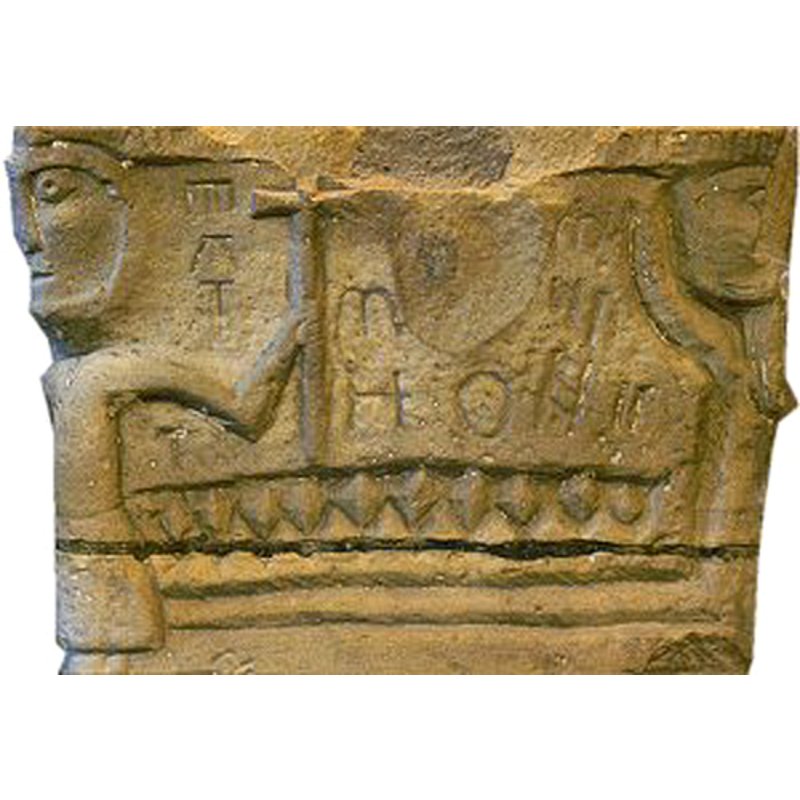
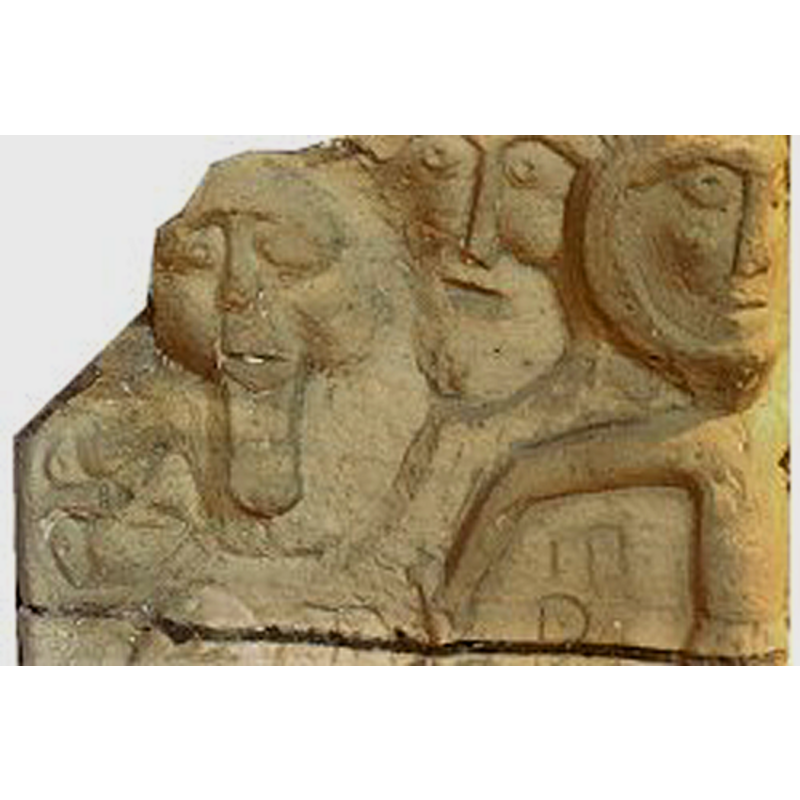
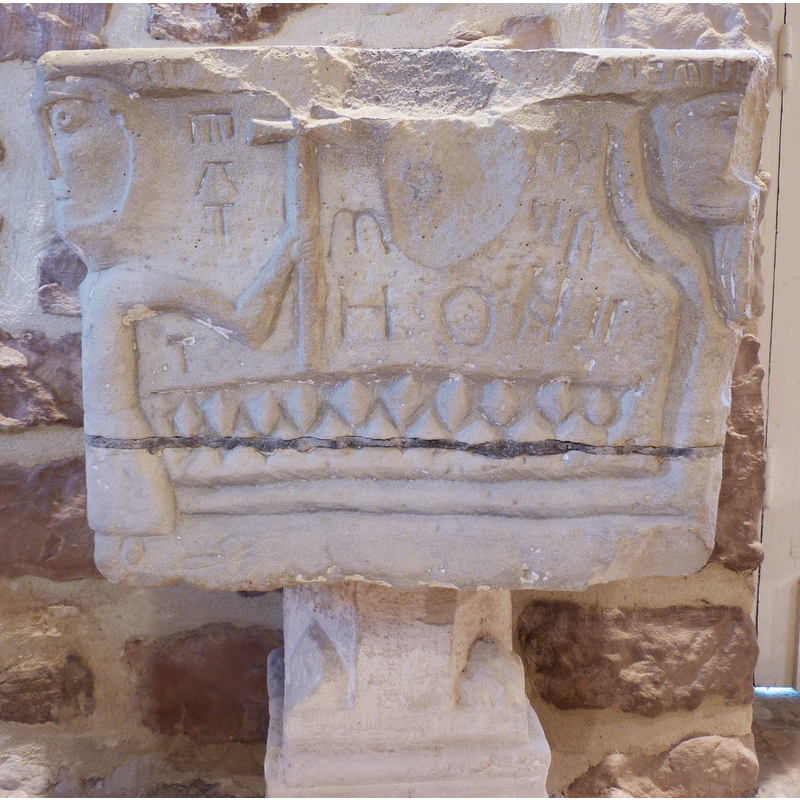
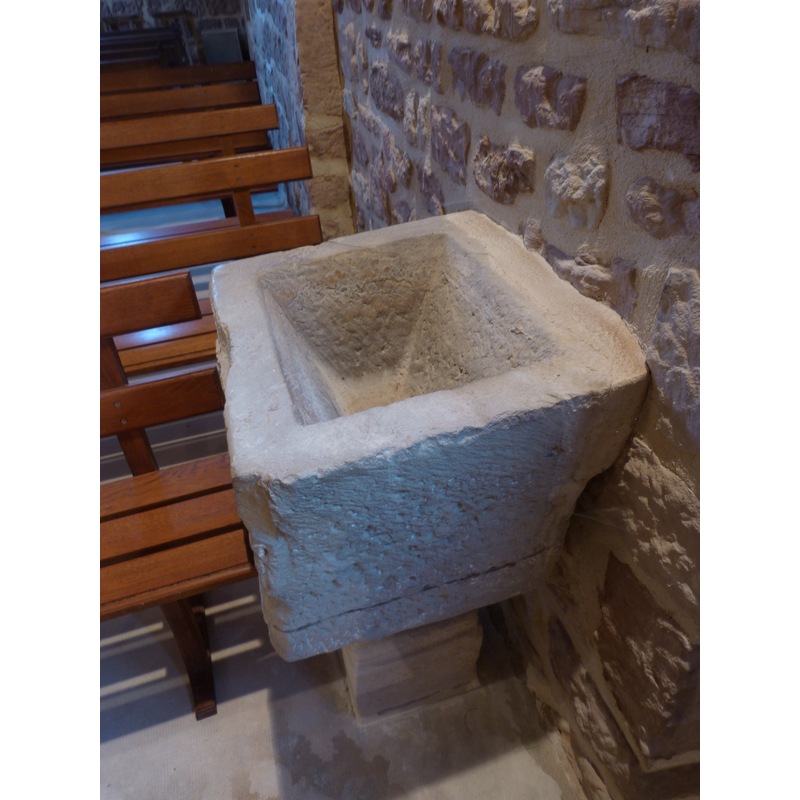
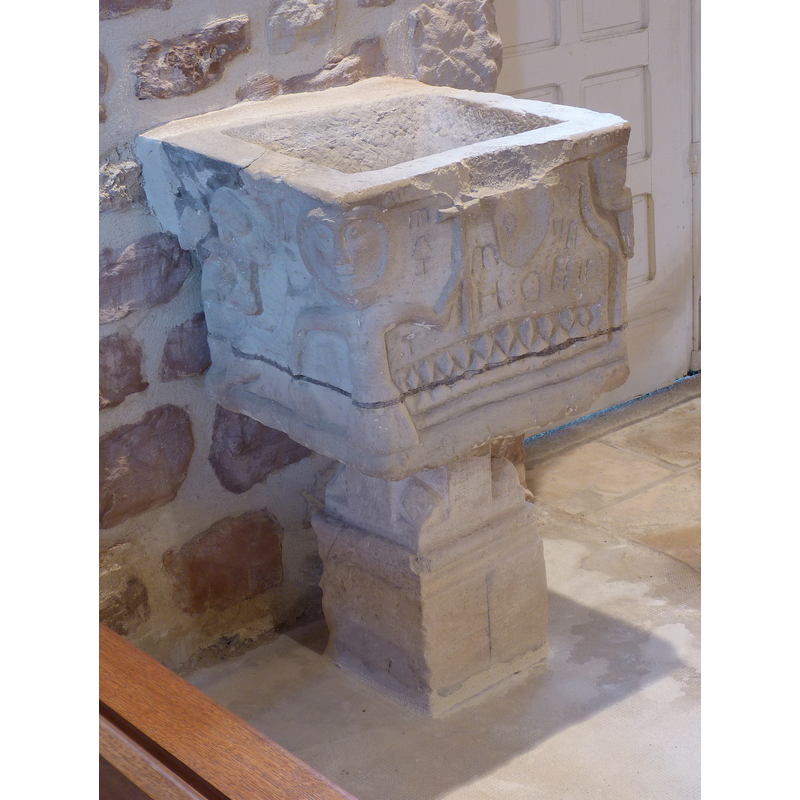
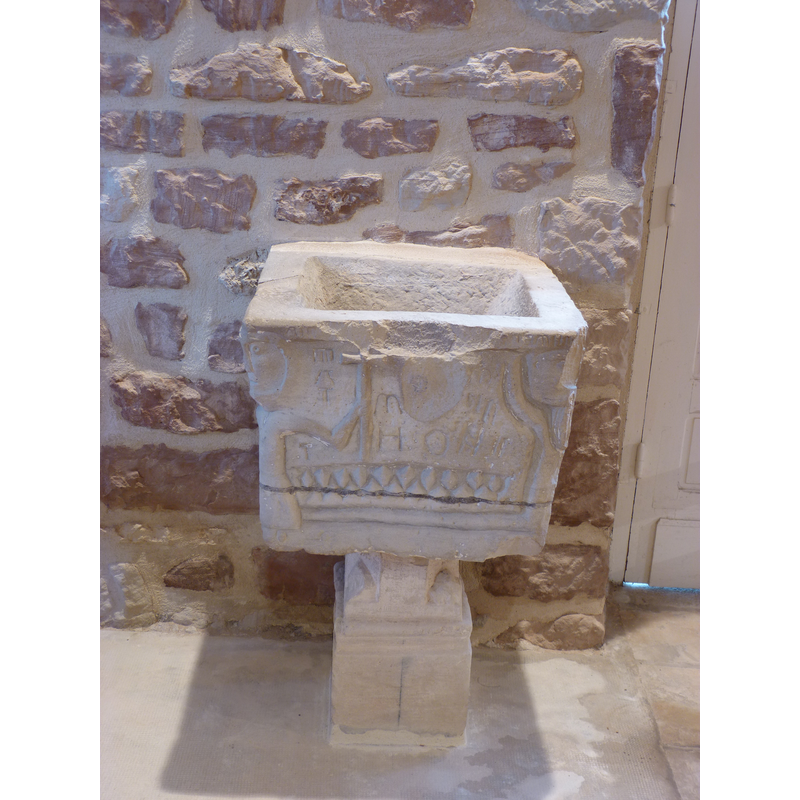
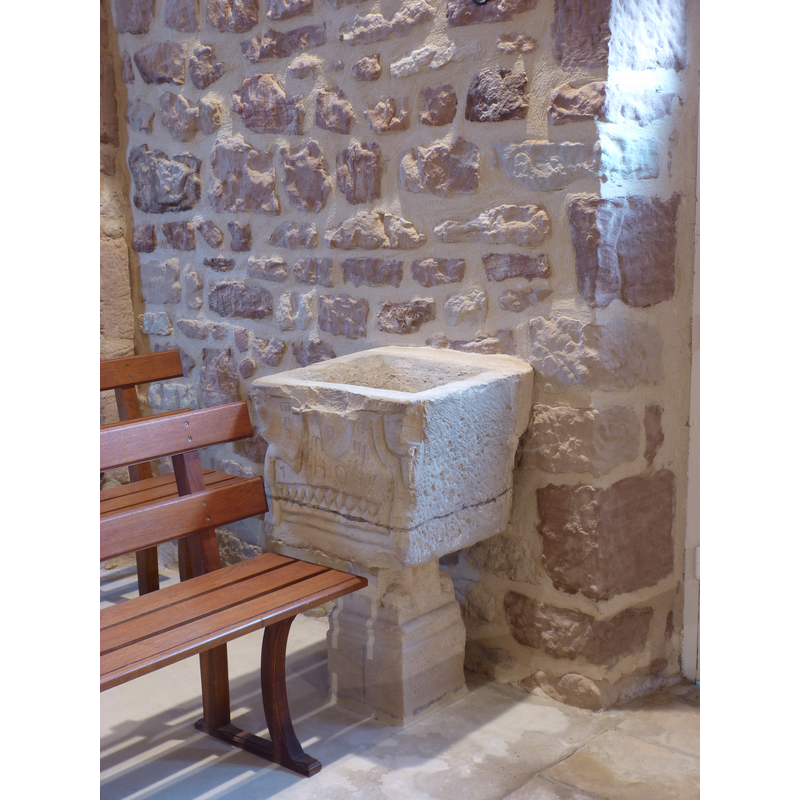
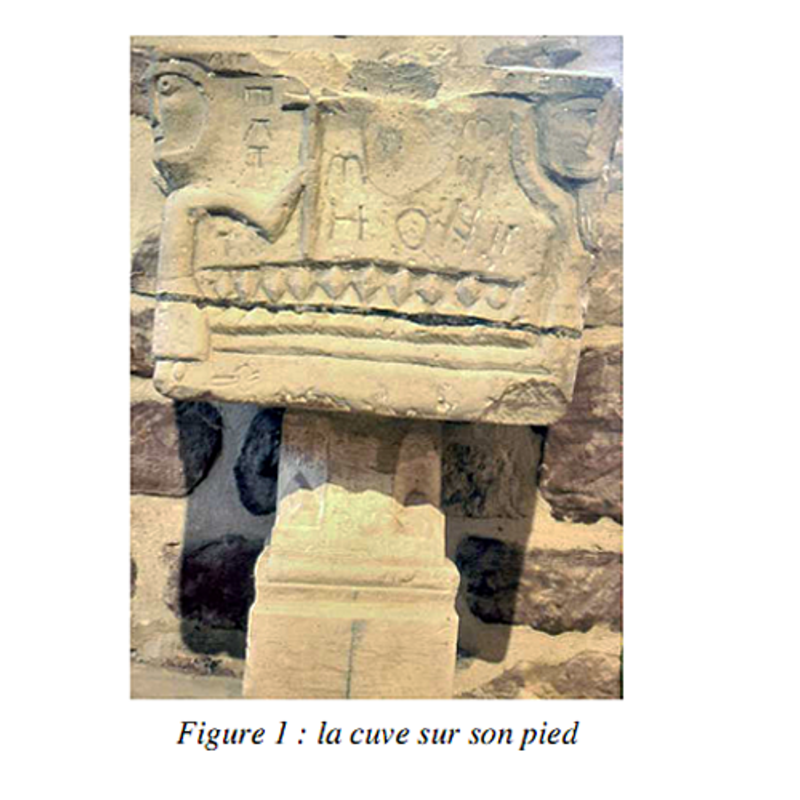
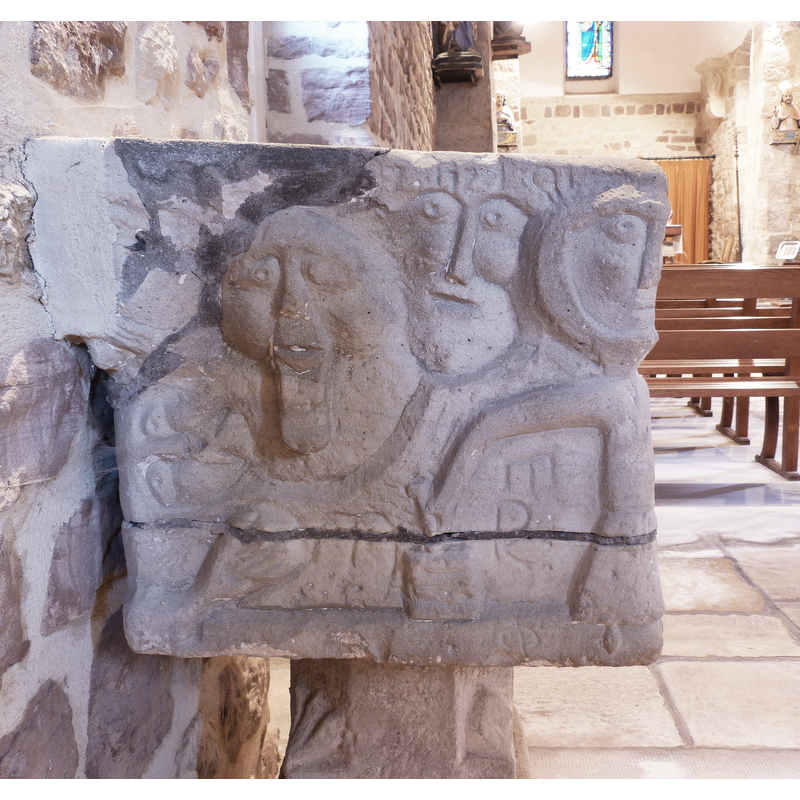
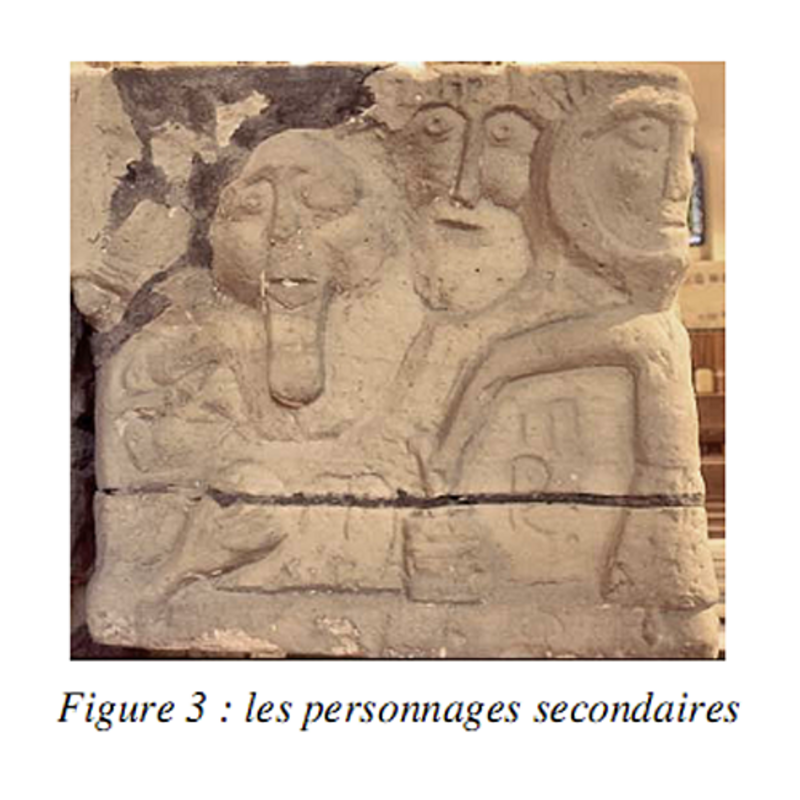
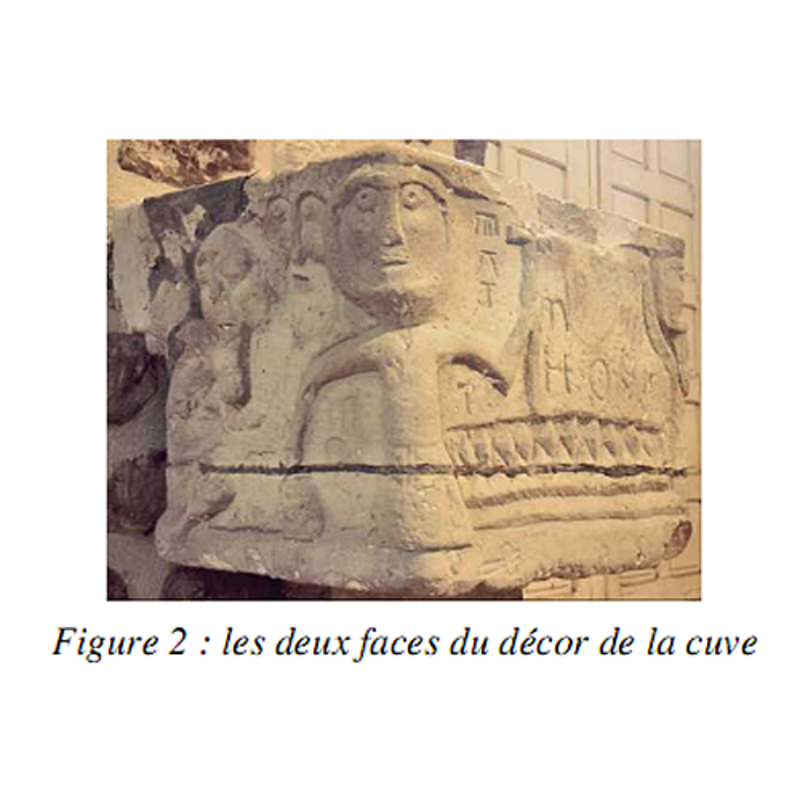
![Source caption: "Trois chapiteaux sont restés à leur emplacement d’origine. Ils représentent des acrobates, un personnage agenouillé entre des lions, et deux saints dans des mandorle, Pierre et un évêque. Ils sont sculptés dans le calcaire [...] Tous datent du milieu du XIIe siècle."](/static-50478a99ec6f36a15d6234548c59f63da52304e5/compressed/1170219013_compressed.png)
![Source caption: "Trois chapiteaux sont restés à leur emplacement d’origine. Ils représentent des acrobates, un personnage agenouillé entre des lions, et deux saints dans des mandorle, Pierre et un évêque. Ils sont sculptés dans le calcaire [...] Tous datent du milieu du XIIe siècle."](/static-50478a99ec6f36a15d6234548c59f63da52304e5/compressed/1170219012_compressed.png)
![[cf. Font notes]](/static-50478a99ec6f36a15d6234548c59f63da52304e5/compressed/1100918004_compressed.png)